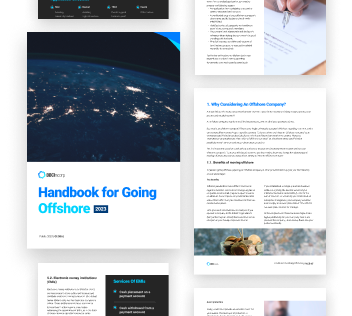
Table of Contents
The fundamentals of an offshore company for international trading
People say offshore companies are the top-notch options for international trading structures.
But, what exactly is international trading? It is the purchase of low-cost goods in countries such as China, India, Vietnam, etc. then selling them in high-income marketplaces such as the US, Europe, Australia, etc.
However, the actual trading operation takes place in a completely different country from the one mentioned above. The goods that are purchased by the trading company are sent straight from the production country to the country where they will be sold.
And because of its nature, international trading companies are often associated with offshore company structures.
Whether going offshore is the best decision for your trading company or not lies in your business operating countries. Let’s take an in-depth look at things you should consider before turning your typical trading company into an offshore entity.
The issues associated with offshore company for international trading
Besides tons of benefits, it is undeniable that there is some serious downside to offshore jurisdictions. Here are all the issues you need to consider:
Country reputation
Offshore jurisdictions bring plenty of benefits. However, the evasion activities of these advantages have given a deprived reputation to offshore countries.
Believe it or not, offshore jurisdictions are often associated with tax evasion. Therefore, some of the countries of the customers will put great inspection for invoices issued by tax havens – offshore countries with bad reputations. Or in even worse cases, they don’t even accept those invoices.
The best and most prominent solution is to pick reputable offshore jurisdictions as well as ensure to comply with all legal obligations in a legitimate manner.
Recommended reading: Top 6 best offshore company jurisdictions
Licenses and permits
No matter what your business scope is, the very first thing you need to obtain is a business license and/or permits from the relevant authorities. Be noted that some business licenses and permits are issued by the federal, some by the state, and some by local authorities.
Regardless of your incorporated country, if your business activities fall within regulated activities in the jurisdiction, it is vital that you apply for a license or permit.
There are also some special cases where the incorporation service provider will reject your application. These cases often fall into companies that are doing business in the following fields: pharmaceutical, medical device provider, cigarette/tobacco, alcohol, chemicals, etc.
Location of supplier and customer
The location of your suppliers and customers can also be a break-or-make point for your business.
- VAT Exemption
If your supplier resides in one of the countries in the EU, and your customers are located in another EU country, then your company is eligible for VAT exemption intra-community transactions within the EU. However, to be qualified for an exemption, the transaction must meet certain conditions as per the law.
- Free Trade Agreements (FTA)
Conducting business in countries where trade barriers are eliminated thanks to Free Trade Agreements is also a strategic move for all trading company owners.
There are roughly 300 FTAs around the world (counting FTAs that are in the planning stage). The US alone has 20 existing FTAs with countries worldwide, with Panama being the latest country to sign an FTA.
- Banking issues
Another issue associated with the supplier and the customer’s location is banking. It is undeniable that having a company in the same country as your suppliers or your customers brings countless benefits.
Some banks could block your account if they see you receive money from or send money to non-popular jurisdictions (or blacklisted countries). This also leads to more difficulties to obtain the necessary banking services.
You can avoid this issue by registering an offshore brokerage account, but make sure you have meticulous planning and financial preparation before doing so.
Business size
Your business size is also a fundamental issue that needs to be thoroughly considered. The cost of setting up a trading company in an offshore jurisdiction is no small number. It, in fact, can be more costly than incorporating a company in your country.
The real question is: “Which one is more reliable: a typical company in your home country with no tax exemption and many issues to be solved or a costly offshore company with all the ideal tax benefits?”
After finding the perfect answer to this question, the next step is to check whether your company has enough substance to be deemed as a tax resident in the targeted offshore country.
Though these issues are mainly about your company and you, an expert’s opinion is advisable on this specific occasion.
Controlled foreign corporation rules (CFC Rules)
As you might already know, one of the primary purposes of going offshore is to make use of favorable tax systems. CFC rules were created for the same reason.
It is a set of rules that are created to prevent firms from shifting their profits and evading taxes in their home country. CFC rules will evaluate and decide how much profits from foreign sources will be taxed domestically in the country where the parent company resides.
This can cause quite big hindrances if your main reason for going offshore is because of tax benefits.
Transfer-pricing Rules
Similar to CFC rules, Transfer Pricing rules are meant for anti-tax avoidance of all cross-border transactions.
Let’s say, the Transfer Pricing rules in the UK present how transactions between a firm and its related entities are handled. The rules are also in accordance with many other countries – based on the international “arm’s length principle”.
Furthermore, the “arm’s length principle” applies to transactions between connected parties such as a parent company with its subsidiaries. And for tax purposes, these transactions are handled by reference to the profit that would have arisen if the transactions had been operated under comparable conditions by completely independent entities.
The United Kingdom is not the only country in the world that uses this set of rules. Each country has its own different rules about the pricing methods and what reporting is involved.
These rules are obligated. And if you don’t follow the rules, or you do it and misprice those transactions (also widely known as transfer mispricing), you are now subject to hefty fines. In some extreme cases, the fine can range up to 400% of the difference.
Free ebook
New to offshore business landscapes?
All the essential information you need is right here.

Conclusion
It is no myth that most investors will go with an offshore company structure to trade internationally. And it is also understandable why most of them do that. However, before thinking of offshore company incorporation, thorough research is advisable.
Should you have any questions in regards to an offshore company for international trading, feel free to contact us at service@bbcincorp.com.
Disclaimer: While BBCIncorp strives to make the information on this website as timely and accurate as possible, the information itself is for reference purposes only. You should not substitute the information provided in this article for competent legal advice. Feel free to contact BBCIncorp’s customer services for advice on your specific cases.
Industry News & Insights
Get helpful tips and info from our newsletter!
Stay in the know and be empowered with our strategic how-tos, resources, and guidelines.





